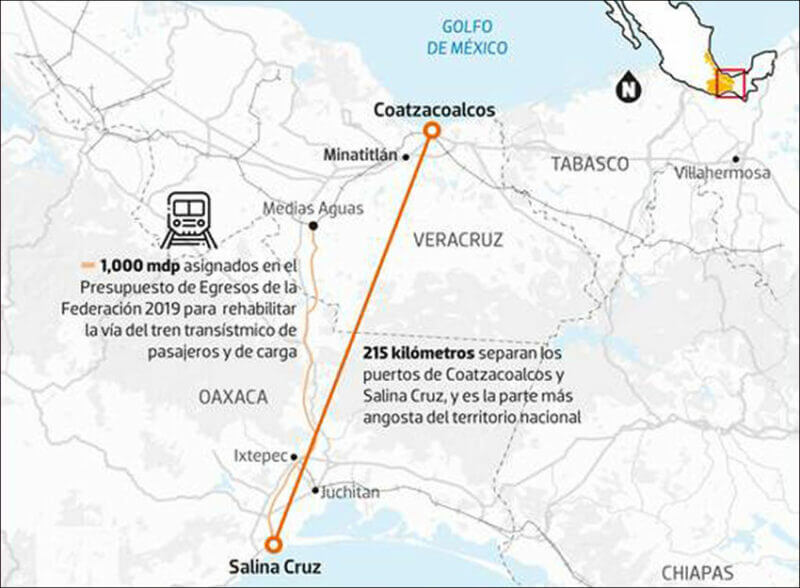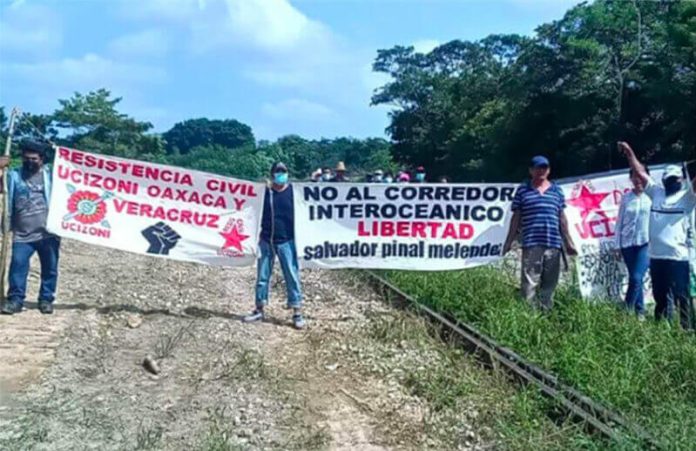More than 70 organizations from eight states have condemned government harassment of opponents of the Isthmus of Tehuantepec trade corridor – a major federal government infrastructure project – and people engaged in civil resistance against alleged abuses by the Federal Electricity Commission (CFE).
A group of indigenous, farming, union, human rights and other non-governmental organizations said in a statement that community landowners and officials in the Isthmus region as well as members of organizations such as the Union of Indigenous Communities in the Northern Zone of the Isthmus have been harassed by federal and municipal authorities.
“We denounce that the federal government, municipal authorities and private individuals have violated the rights of the indigenous peoples of the Isthmus of Tehuantepec constantly, simulating consultations, hiding information and invading and dispossessing land,” said the organizations, based in Oaxaca, Veracruz, Chiapas, Hidalgo, Morelos, México state, Tlaxcala and Mexico City.
“In addition, they’ve provoked division and confrontation in the communities. They’ve also harassed, threatened and jailed those who demand respect of their rights,” they said.
The organizations, among which are the Zapatista Indigenous Agrarian Movement, the National Union of Agricultural Workers and the Human Rights and Social Justice Action Group, outlined a range of “repressive acts” recently committed against opponents of the project, which includes modernization of the railroad linking the Pacific and Atlantic oceans between Salina Cruz, Oaxaca, and Coatzacoalcos, Veracruz, and construction of a new highway across the isthmus.
In one case last month, the organizations said, a group of armed men directed by “the criminal Anastasio Gutiérrez,” an Institutional Revolutionary Party politician, invaded a property in Santo Domingo Tehuantepec, Oaxaca, owned by Zapotec farmer Salvador Pinal Meléndez.
The statement said that Pinal and his two sons confronted the men, who were “causing damage,” but were detained. The farmer’s two sons were later released but he remains in custody and faces criminal charges, the organizations said.
“The criminal group has dedicated itself to dispossessing community landowners and owners of small properties near the railroad because great speculation of land related to the. … mega-project has been unleashed,” the organizations said.
They also outlined abuses, harassment, violence, unlawful arrests and near-confrontations in other parts of the Isthmus region.
On October 2, the leader of a group of 3,500 people refusing to pay their electricity bills due to CFE “abuses” was attacked on a highway in the municipality of Matías Romero, Oaxaca, the organizations said.
They said that three individuals blocked the vehicle of Teófilo García Sarabia, pointed a gun at him, pulled him out of his vehicle and demanded that he cease leading protests against the CFE. Two of the men subsequently broke his car’s windscreen and removed its side mirrors, the organizations said, adding that the incident has been reported to authorities.

On October 8, Micaela Valdivieso Joaquín, an indigenous Mixe woman and teacher, and her daughter were detained by police and the National Guard and held in Oaxaca city for more than 48 hours, according to the organizations. The woman’s only “crime,” they contended, was initiating legal action against the trade corridor project on the grounds it will cause environmental damage.
The organizations laid out four demands to state and federal authorities: the cessation of harassment against farmers, community officials and members of social organizations; the provision of “sufficient and culturally appropriate information” about the impacts of the trade corridor project; the immediate release of Salvador Pinal Meléndez; and the cessation of “repressive actions” by the CFE against members of civil resistance organizations.
To pressure authorities to meet the demands, members of the Civil Resistance Network, an umbrella group of non-governmental organizations, have carried out a range of actions including railroad and highway blockades in the Isthmus region. They also expelled a group of workers carrying out work to modernize the trans-isthmus railroad, according to a report by the news magazine Proceso.
The Civil Resistance Network members say they have sought meetings with federal and state authorities but their requests have been rejected.
Touted as a potential rival to the Panama Canal, the Isthmus of Tehuantepec trade corridor is one of several major infrastructure projects the federal government is currently building. The 4.6-billion-peso (US $224.8 million) project also includes upgrades to the ports in Salina Cruz and Coatzacoalcos and the establishment of 10 new industrial parks. It is slated for completion in 2022.
President López Obrador said in May that the navy will be given control of the trade corridor once it is completed.
“It’s to the navy that we’re going to entrust all these public works when we finish them, for the good and for the progress of our country,” he said.
Opposition to the project began shortly after it was announced in late 2018. Many Isthmus residents reject government claims that they will benefit economically and assert that it will damage the environment and adversely affect their way of life.
With reports from El Universal and Proceso
